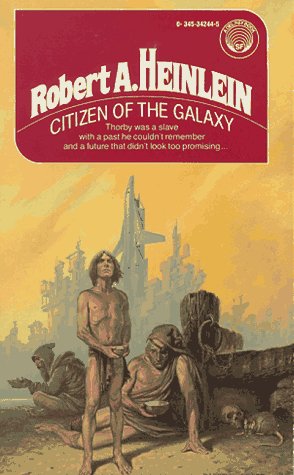
![]() Citizen of the Galaxy by Robert A. Heinlein
Citizen of the Galaxy by Robert A. Heinlein
Robert A. Heinlein’s best books are those he wrote for kids, and Citizen of the Galaxy is one of the best of those. Originally serialized in Astounding Science Fiction in 1957, this is an anthropological adventure story with strong libertarian and anti-slavery themes.
We first meet Thorby, a young belligerent orphaned slave boy, as he has just landed on an unfamiliar planet and is on the auction block. Nobody wants him — he’s too feisty — but he is eventually sold for a pittance to Baslim, a man who appears to be a crippled beggar. Despite Baslim’s kind treatment, it takes a while for Thorby to warm up, but once he does he discovers that Baslim is more than he seems. Under Baslim’s tutorage, Thorby becomes an accomplished and very well educated beggar.
Eventually Thorby must leave his new home, but the knowledge and connections he received from Baslim serve him well. After much travel, adventure, contact with many diverse cultures and customs, and after several changes in status and lifestyle which allow him to experience the entire spectrum of class, Thorby would seem to be a completely different person than the boy we met on page one. But Thorby never forgot that auction block and, realizing that this is what education and freedom are for, he sets out to make the world a better place for future orphaned slave boys.
 As with so many of his “Juveniles,” Heinlein’s Citizen of the Galaxy captures the reader’s imagination from the very first page with characters, setting, and circumstances that are totally compelling and a plot that races along. Heinlein’s young protagonists are delightful kids (why can’t he write such delightful protagonists in his adult novels?) and their problems feel so real. Thorby deals with abandonment, loneliness, distrust, bullying, lack of identity, and the feeling that there is no place in the universe where he belongs.
As with so many of his “Juveniles,” Heinlein’s Citizen of the Galaxy captures the reader’s imagination from the very first page with characters, setting, and circumstances that are totally compelling and a plot that races along. Heinlein’s young protagonists are delightful kids (why can’t he write such delightful protagonists in his adult novels?) and their problems feel so real. Thorby deals with abandonment, loneliness, distrust, bullying, lack of identity, and the feeling that there is no place in the universe where he belongs.
Heinlein’s Juveniles feel less dated to me than his adult novels do. I think that’s because in his stories for kids, Heinlein seems to always include strong women in leadership positions, despite the fact that he probably knew very few, if any, back in the 1940s and 50s. However in his novels for adults, most of his women are bimbos. I suppose that’s because he was writing those novels for adult men (surely his biggest audience) and, therefore, these women are filling sexual roles. In contrast, the women, even those in high power positions, all have a motherly cast in his Juveniles. I’m pretty sure this is the main reason I dislike so many of Heinlein’s adult novels but still love the ones I read when I was a kid.
I listened to Blackstone Audio’s version of Citizen of the Galaxy which was read by Grover Gardner. He’s become one of my favorite readers since listening to him narrate all the MILES VORKOSIGAN books last year. I love his voice and he’s a great storyteller, using the perfect inflections and cadence to make the story flow quickly and effortlessly along. I highly recommend Citizen of the Galaxy in this format.



Excellent review Kat. I first read this novel in elementary school and its been a favorite ever since. I think you may have hit the head of the proverbial nail squarely when you muse as to why Heinlein’s juveniles are so much better than this later more “adult” works. Heinlein’s women characters in his later works seem stereotyped and weak to me.
Thanks, Steven! It was a disappointment to me when I got older and realized that Heinlein wasn’t writing for me (a girl).
But then, even Andre Norton’s juveniles seem male-oriented.